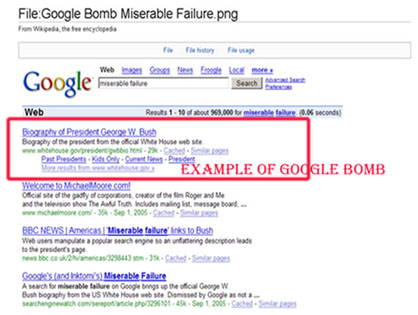It is a way of influencing the rank of a page by artificially increasing the number of linking to it and the anchor texts used for that.

A black hat SEO practitioner will manipulate Google’s algorithm by “helping” one-page rank for an entirely different keyword. This happens because it is the same anchor text used for the pages that link to that page in particular.
One of the most discussed examples of Google bombing was the query “completely wrong” for Mitt Romney. If you search images for “completely wrong”, Google will show you a picture with Mitt Romney.
The terms Google bombing and Google washing refer to the practice of causing a website to rank highly in web search engine results for irrelevant, unrelated or off-topic search terms by linking heavily. In contrast, search engine optimization (SEO) is the practice of improving the search engine listings of web pages for relevant search terms.
Google-bombing is done for either business, political, or comedic purposes (or some combination thereof). Google’s search-rank algorithm ranks pages higher for a particular search phrase if enough other pages linked to it use similar anchor text.
By January 2007, however, Google had tweaked its search algorithm to counter popular Google bombs such as “miserable failure” leading to George W. Bush and Michael Moore; now, search results list pages about the Google bomb itself. Since no later than 21 June 2015, the first result in a Google search for “miserable failure” is the Wikipedia article defining Google bomb. Used both as a verb and a noun, “Google bombing” was introduced to the New Oxford American Dictionary in May 2005.
Google bombing is related to spamdexing, the practice of deliberately modifying HTML to increase the chance of a website being placed close to the beginning of search engine results, or to influence the category to which the page is assigned in a misleading or dishonest manner.
By studying what types of ranking manipulations a search engine is using, a company can provoke a search engine into lowering the ranking of a competitor’s website. This practice, known as Google bowling, is often done by purchasing Google bombing services (or other SEO techniques) not for one’s own website, but rather for that of a competitor. The attacker provokes the search company into punishing the “offending” competitor by displaying their page further down in the search results.
For victims of Google bowling, it may be difficult to appeal the ranking decrease because Google avoids explaining penalties, preferring not to “educate” real offenders. If the situation is clear-cut, however, Google could lift the penalty after submitting a request for reconsideration. Furthermore, after the Google Penguin update, Google search rankings now take Google bowling into account and very rarely will a website be penalized due to low-quality “farm” backlinks.
